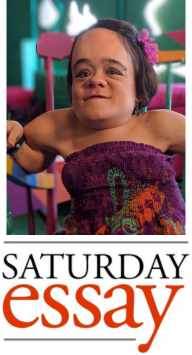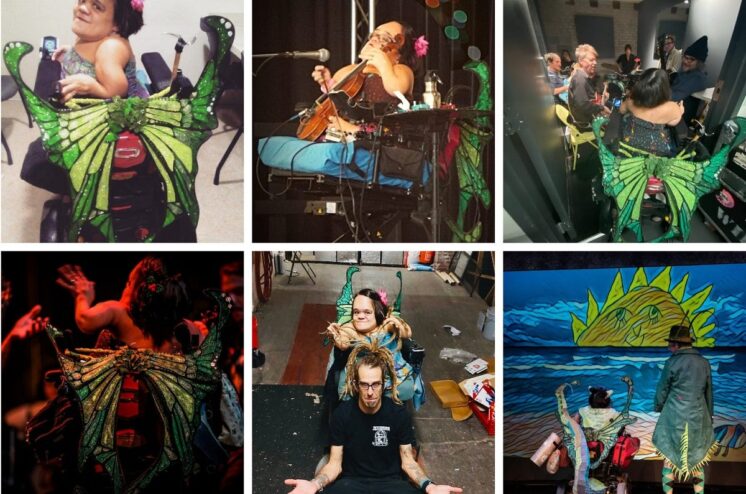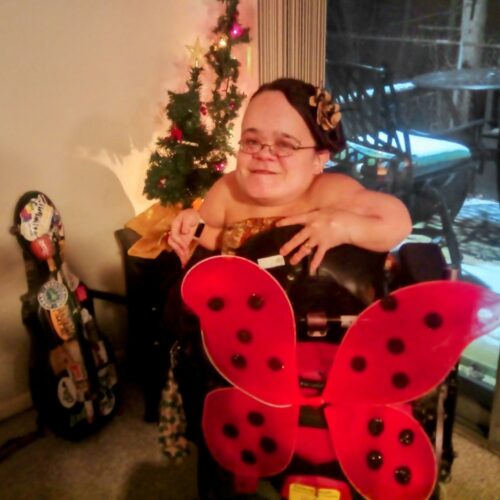Wings as a Fashion Accessory
 Back in 2019 I was invited to speak at an arts-centered retreat called “Life is a Verb Camp” in North Carolina. My speech happened to fall on Halloween, so this camp organizer (author Patti Digh) had set a bunch of costume pieces out on a long table and told folks they could wear them.
Back in 2019 I was invited to speak at an arts-centered retreat called “Life is a Verb Camp” in North Carolina. My speech happened to fall on Halloween, so this camp organizer (author Patti Digh) had set a bunch of costume pieces out on a long table and told folks they could wear them.
I approached the table and there they were, shimmering: a large, green, sparkly pair of butterfly wings with two little arm straps. I fell in love instantly, and asked my husband Paul if he could hang them on the back of my chair. They slipped over the handlebars easily and suddenly my wheelchair was transformed into a fantastical thing of beauty. It’s like it had been waiting for the wings forever.
I wore them all weekend, long after my speech had ended, and the wings not only filled me with delight, but they brought cheer wherever they went. People would grin whenever I’d turn to the side, revealing the wings behind me. I realized, for the first time in my life, my wheelchair was finally a true visual expression of my internal aesthetic. If you could see the color palette of my soul you’d know it has a lot of sparkles, rainbows, flowers, and jewel tones.
The Perception Gap
Wheelchairs are tricky things. To the people who use them daily, they are beloved entities, like your favorite dog. They are your trusty companion; they not only give you mobility (an obvious plus) but they provide a place to hang your purses, to sit comfortably in a chair-less room, and they are great at splashing through puddles. Your wheelchair is your friend, a major ally.
Paradoxically, it’s also just not that big of a deal. I don’t think about my wheelchair constantly, in the way those who can walk likely don’t ponder the existence of their legs when moving about the room. They are just there, they are part of you.
But that’s not how much of the world sees it. Disability still holds many negative connotations in our society. So to most folks, if they need a wheelchair to get around, it would be a very bad thing. As a result, people feel awkward around wheelchairs. Instead of saying something typical, like “hello,” strangers often say things like, “Do you have a license to drive that thing?” (If you listen closely enough, right now, you can hear the collective eye-rolls of every wheelchair user on the planet). For context, imagine, the next time you were in the grocery store, someone commented on how strong your thighs looked or asked if you have permission to be walking right now. It would be strange!
Sarcasm aside, I am generally pretty tolerant of people’s well-meaning but misguided remarks, because I know they are just trying to connect over something they don’t understand (and maybe think is just a wee bit tragic). They are trying to reach out.
But suddenly, with the wings, they forgot that my wheelchair was supposed to be sad! They smiled in spite of themselves, without even realizing it. “I love your wings!” strangers would call from across the lawn at camp. They finally saw my wheelchair as fun and worthy of delight, which is how I had seen it for years.
I wore those wings all weekend at Life is a Verb Camp, and then I accidentally wore them home. When I realized I’d stolen them, I called Patti in a panic and she just said, “I think you were meant to have them.” I believe she was correct, but also North Carolina is far away from Minnesota and they would have been difficult to mail.
I started wearing the wings at shows. At first I was a little self-conscious about it, but I did really love those things and I wanted to make a statement. Disability can be a bonus, a fun tool for self-expression. Decorating my chair felt like a piece of the Disability Culture puzzle. And the disabled people at my shows were thrilled when they saw the wings. We bonded over them.
When the pandemic hit, I started wearing my wings full-time. For one thing, they took up a lot of room on our coat rack, so it was a little easier to have them hanging on my wheelchair. But also, they reminded me that, even though I felt trapped and isolated, I was still a vibrant, creative person. Wings helped me to cope, and they also were great conversation starters at our apartment complex. Recently our across-the-hall neighbor brought over a pair of ladybug wings for my chair and said, “I saw them at Dollar General and I thought of you.” I was touched by her gift. They are my current wing of choice at the moment.
Now I am not saying everyone should put wings on their wheelchair. That is a rather flashy fashion choice, I’ll admit. But what if we viewed our chairs or canes or walkers as an extension of our wardrobe? Would that not only change the way they are viewed by others, but bring us delight as well?
Accessorizing the Future
I asked this question about accessorizing at a recent Recording Artists and Music Professionals with Disabilities meetup on Zoom, and I was very heartened by the response. Lachi, the organization’s founder, has a business partner named Arthur, and that day told the story of how he is hand-making GlamCanes for blind and low-vision people to bling up their white canes. You could have one to match every outfit if you collect them long enough! At a recent disability conference, he and Lachi set up a make-your-own-GlamCane room. An hour later he was happily surprised: the room had filled up! People were excited to be glamming up their canes. Another RAMPD member, DJ Pastor Rock (founder of the nonprofit Rolling Nation) said, “I wouldn’t want wings on my chair, but I would want gold rims.” I asked my assistant, Carrie, if she ever decorates her wheelchair, and she said she loves thought-provoking bumper stickers, and for holiday parties she has been known to adorn her chair with strings of battery-powered twinkle lights. So obviously how you express yourself by accessorizing your mobility aid is a totally personal thing, but I think it’s a fun thing that is long overdue.

Photos of Gaelynn Lea wearing her green butterfly wings! 1) Gaelynn showing off her green wings backstage, before a speech and performance at a university. 2) Gaelynn performing at a high school, wearing her wings. 3) Gaelynn rehearsing with Wilco before a concert in St. Paul where she opened and sat in with tht band during the encore (all while wearing her wings). 4) Gaelynn dancing with wings during the final song at a 2019 Pigface concert in Chicago. 5) Gaelynn wearing wings and holding up Randy Blythe’s dreadlocks before the Pigface show. 6) What’s better than wings? Wings and a tail! Gaelynn performing with Kevin Kling in the new musical play “Invisible Fences.” They are facing away from the audience, looking at a giant sunrise and Gaelynn has both wings and a curly tail attached to the back of her chair.
When I was in junior high, I wanted to minimize my chair as much as possible. Black, please. Not too bulky. Maybe people wouldn’t even notice the chair if I made it as boring as possible. It wasn’t that I hated my disability (not exactly) but I desperately wanted to be a “normal” kid, whatever that was. I wanted to read Cosmopolitan magazine, get a boyfriend, and save up for a cool car. But I was a nerd who was destined for a minivan, so I settled for a couple of years reading Cosmo and having unrequited crushes on a different boy every few months. But as my comfort with my disability identity has grown, so too has my relish for accessorizing my chair. Toward the end of high school, my clothes got more outrageous (I once wore a velvet Santa-themed nightie to school, replete with white feathery trim) and my wheelchair was adorned with colorful stickers. So it’s a natural evolution, this disability journey. It’s not one size fits all.
Apparently this idea of wheelchair as accessory has taken root in some places, because in 2018 I performed at the Osteogenesis Imperfecta Foundation national conference, and practically every wheelchair-using kid had sweet, customizable inserts in their tires. I was momentarily jealous — that wasn’t my childhood! I would have totally gone for a rainbow unicorn if I hadn’t felt secretly weird about the fact that I used a wheelchair.
So times are indeed changing. This is great news! For those of us in the older generations (I am about to turn 40, after all) it might take a little reflection and experimentation before we get comfortable with the concept of playing with the aesthetic of mobility devices. Maybe it’s not for you at all, and that’s okay, too.
And for those who are nondisabled, I’d urge you to examine your automatic thoughts when someone says “I use a wheelchair.” Is it sadness, pity, or even a little teeny bit of disgust? Whatever it is, no judgement from me here, because the education around disability has been pretty abysmal up until now. But now that you know, try to reboot your thinking! Remember, a wheelchair is a glorious tool for freedom. Imagine some wings on it, and fly.
Gaelynn Lea is a musician, public speaker and disability rights advocate. Her debut memoir, “Linger in the Sun” will be released by Algonquin Press in 2025. This essay originally appeared on her Substack newsletter.
Recommended Links:
Leave a Comment
Only registered members can post a comment , Login / Register Here















1 Comment
Helmut Flaag
about 11 months ago